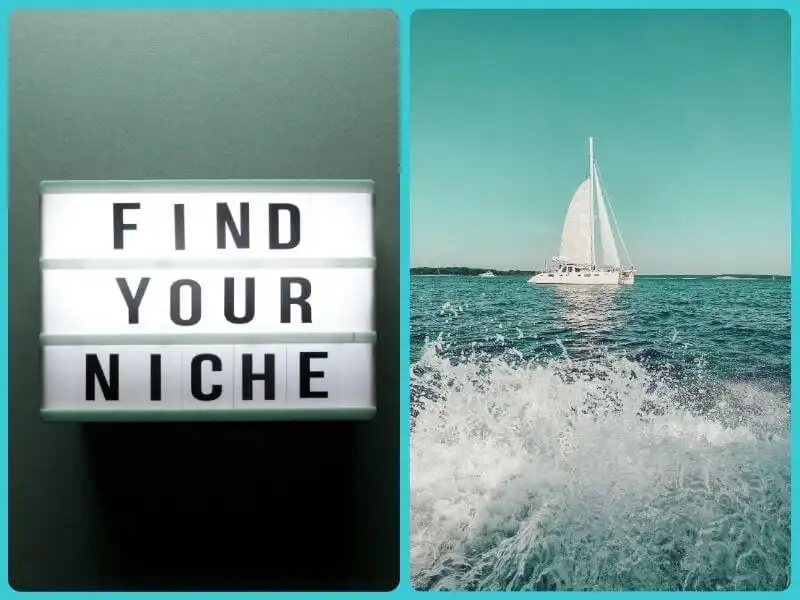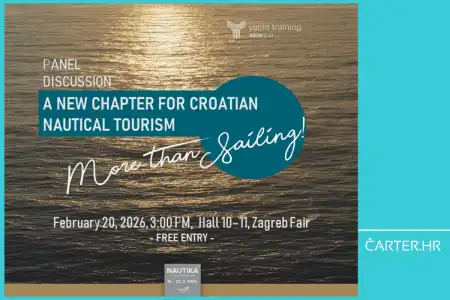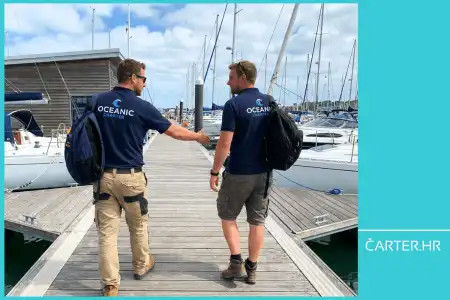
Have your guests ever asked you where the best trekking trails are on the islands? Or what the fishing rules are? Were these moments when you realized that chartering has stopped being just about renting a boat? More and more guests today are seeking vacations that match their habits or values. And this is where niche marketing opens up space. Marketing that is not aimed at "everyone", but precisely those who know what they want.
What was once enough – a sailboat, a good route, a skipper, maybe a recommendation for a good restaurant – today is just the foundation you need to build upon.
More and more guests are arriving with a clear idea of what they want from their vacation. They no longer seek just sailing, but something that is uniquely theirs. Some want peace, quiet, and the ability to practice yoga on the deck. Others want to visit every restaurant on every island. Others are looking for an active vacation, but for children.
Sounds very specific? Quite the opposite. Niche charter offers are increasingly in demand, and there lies a great opportunity. You are adapting to real people and building trust with an audience that knows what it wants. And such guests return. And talk about you.
So, what happens when yacht charter is no longer just that?

1. Imagine your niche as a small world
Wellness, gastronomy, adventure, education, a slightly different family vacation... each of these niches has its own rules.
A guest coming for a wellness charter wants peace, a simple rhythm, carefully selected food, and communication that isn’t forced. On the other hand, a guest who loves adrenaline will look for the best route details, dynamics, and a dose of challenge.
These two guests will not react the same to your offer and communication.
It is important that everything in your presentation reflects that personalization – the tone of the message, the photos, the music, even the fonts you use.
Example: If you target wellness guests, you will not post party or socializing photos on social media. Visuals of peaceful mornings at anchor will trigger the reactions you want from the audience you want.
2. Build a community, not just an offer
In niche marketing, it’s not about quantity – it’s about creating a sense of belonging. Guests don’t just want an arrangement; they want to feel understood or that someone thinks like them.
This is built through content. And content that doesn’t sell but "tells a story."
Example: If you choose a gastronomic charter niche, let your skipper be a "local guide" through the markets. Share where to buy good cheese, olive oil, which wine is served where. Post a story on social media titled "Morning at the market in Vis" or send a mini newsletter about Dalmatian wines by email.

3. Fewer likes, more real questions
People who seek something specific are usually not impulsive. They will ask questions. They will read between the lines because they know what they are looking for.
First, they want to know if you have what they need, and only then will they consider the price.
If you organize adventure tours, e.g., a combination of sailing and hiking or running, potential guests will not be impressed by general phrases about “experiences.”
They will ask: How long is the tour? What type of shoes are needed? What if it rains? What if someone in the group gives up?
Suggestion: Create a FAQ section on your website titled “Frequently Asked Questions.” Such a section with direct, real questions and your answers helps build trust and reduces the number of hesitant inquiries.
4. Collaborate with people who already know your niche
Forget influencers with thousands of followers who have never seen a sailboat live.
If you offer something real and specific, look for people who really know yachting and yacht charter – people who are already connected with your audience, not just because of the audience, but because of credibility.
Example: Contact moderators of travel agencies or groups on social media that focus on inclusive tourism. These groups often have members with specific desires and interests, and the trust in the recommendations of group leaders is high.
Create a PDF guide with information that is truly important: what the boat looks like, how to get there, whether there is shade, how stable the boat is at anchor, what activities are possible on board and ashore, etc.
5. Niche offers do not mean a smaller budget – they mean a smarter plan
You don’t have to be everywhere. You need to be where it makes sense. When you know who your guests are, you know where to find them – both online and offline.
Family vacation lovers, small group sailing enthusiasts, and guests looking for active tours – each of these groups has its own place. Focus on those touchpoints that create real value.
For example, family yacht charter enthusiasts may not necessarily be on Instagram, but they can be very active in Facebook groups related to family travel or on websites that advise families with children.
Show up there with the right story, but not with a generic sales offer.
Example: Post a video of real guests who vacationed with small children on the boat. Share how they enjoyed a safe and relaxed sail, how the children participated in small tasks on the boat, and learned about nature.
You are not selling anything, just sharing a real story. In that story, guests will not care about the price, but will want to know: "How can I experience the same?"
Instead of classic ads, approach real people. For example, contact administrators of online communities dedicated to family travel, arrange to post a story about your guests who enjoyed sailing and planned family activities. Let the post be honest, with photos and anecdotes – without sales.

Niche is not a limitation, but a call for precision
Niche marketing is often the most natural way to attract guests who truly seek and want what you offer.
Instead of trying to be everything to everyone, try to be perfect for the right audience.
This approach requires more thinking, more careful listening, and the ability to adapt to specific groups.
It’s not something that happens overnight; it’s a continuous way of working that builds trust and relationships.
And the reward? Guests who return because they found exactly what they were looking for, recommendations that come naturally, and a brand that doesn’t have to be everywhere to be recognized – because it is already clearly positioned in its niche.
What’s even more important, your guests won’t just come back, they will talk about you – no advertising needed. Offering them a clear and authentic experience is enough.
Want specific suggestions on how to create a business tailored to your needs?
Need help directing resources towards creating the right experiences for the right audience? Contact us today.

Need inspiration or advice specific to the yacht charter industry?
Sign up for our newsletter and stay updated with the latest ideas and strategies for success.
Categories of trends
- News
- Sale
- Marketing
- SEO
- Web design
- Social media
- Technology
- Regulations
- Management
- Education
- Finances
- User experience
Newsletter
Sign up for the newsletter and receive the latest trends and tips straight to your inbox




